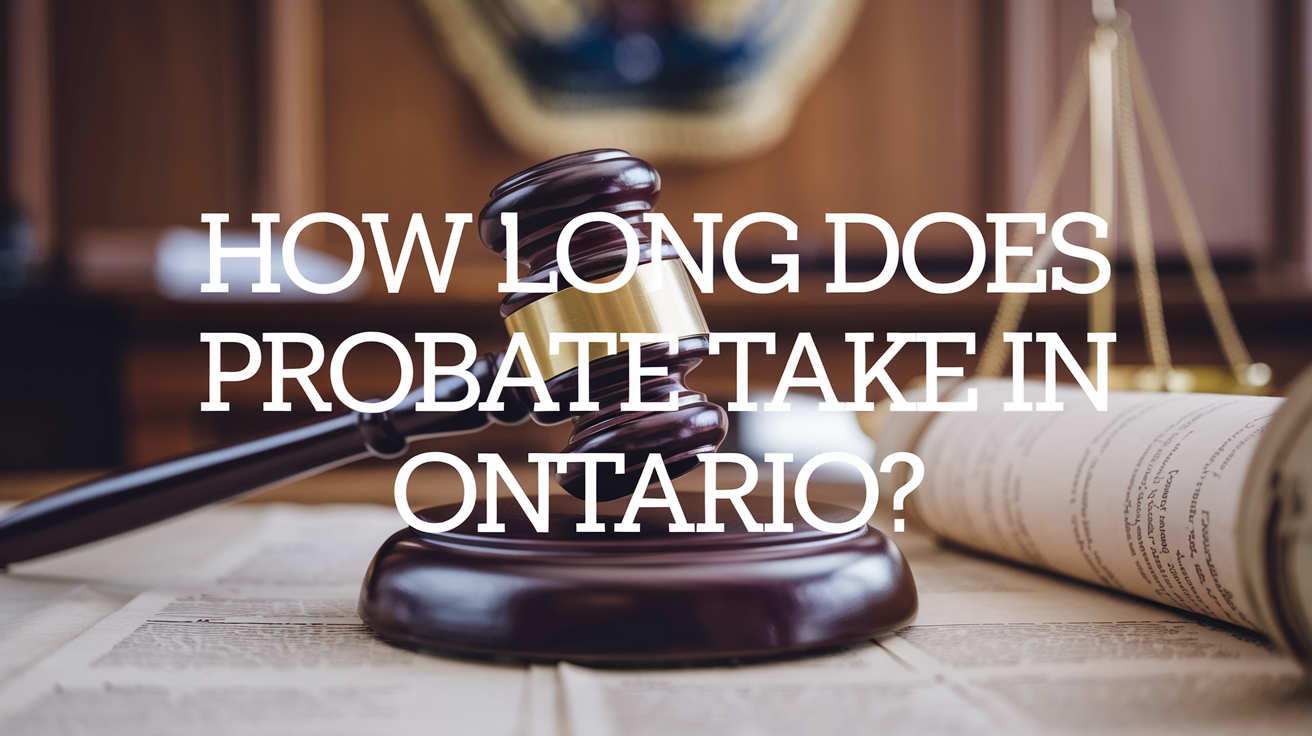
- Tajinder Kaur Sivia
- 26-Feb-2025
Probate refers to the legal process to go through once someone dies. This involves proving that the will of the deceased person exists, proving that it is legitimate, and getting it approved by the court. If probate has been approved, the executor can dispose of the deceased’s assets according to the will. People from Ontario are interested to know how long it takes and what are the stages.
In this blog, we will explain how long in general it takes for probate in Ontario and factors that can affect the duration.
What is Probate?
The probate is the validation of the will of a deceased person and his affiliation with the court. In the absence of a will, the court dispenses with assets under Ontario’s intestacy laws. When a person leaves behind papers of inheritance (a will), the executor named in the will (or an administrator if there’s no will) is given the task of looking after the departed’s property, negotiating any debts, and handing out property to beneficiaries.
In Ontario, if the value of the assets exceeds $15,000, probate is required. For estates below this value, probate may not be necessary but some institutions may try to force probate to release assets.
Steps in the Probate Process
The probate process involves handling a deceased person's estate. It begins with filing a will in court. An executor is appointed to manage the estate. Debts and taxes are paid. Assets are distributed to beneficiaries. The process ensures everything is handled legally and according to the deceased's wishes.
- Locating the Will
The first thing to do is to find the deceased person’s will. It should also state who will oversee the estate. He must then search for the will, ascertain that it is authentic, and present the will to the court for probate.
- Applying for Probate
When the will is found, the executor makes an application for a grant of probate. In this instance, you need to submit a copy of the will, a list of the deceased’s assets, debts, and other relevant documents. These documents will be examined by the court to see if they are in proper form. If all is well, the court will grant a Certificate of Appointment of Estate Trustee with Will (probate certificate).
- Administering the Estate
After probate is granted, the executor can start handling the estate. That includes paying bills, doing taxes, and handing out assets to heirs. Depending on the size and complexity of the estate, it can take months and even years to reach the end of the process.
- Final Distribution
The executor pays all debts and taxes and applies the remaining assets in keeping with the will.
How Long Does Probate Take in Ontario?
Ontario has a probate process that can take from a few months to over a year time frame depending on various factors. Probate can take a minimum of six months on average, but sometimes it can take longer.
The length of probate can depend on several factors, such as the complexity of the estate, how much cooperation the executor provides, or even any sort of dispute among the family members or some creditors.
Some estates might involve the application of special rules, which could extend the timeline further. On average, expect probate to last at least six months, but it may be longer depending on specific circumstances.
Factors That Affect the Length of Probate?
Several factors can affect how long probate takes. The size and complexity of the estate play a major role. Disputes among beneficiaries or creditors can delay the process. The efficiency of the executor also impacts the timeline.
- Complexity of the Estate
The length of the probate process also depends on the size and complexity of the estate. More time may be needed to settle, if there are large estates with many assets or if there are complicated holdings such as businesses, real estate, or investments. This could prolong the probate process further, and the executor will have to figure out the value of assets, gather all relevant documentation, and potentially cooperate with complex tax-related issues.
- Disputes Among Family Members
Probates can become stuck in disputes between beneficiaries or family members. If someone fights with the will or contests the appointment of the executor, it could take months or even years to work out. In addition, fighting about related wills can prolong the probate process even if it’s legal.
- Estate Debts
For large amounts of debt to be paid off, the executor could spend a lot of time dealing with creditors or selling the assets (except those towards the executor) to pay them off. The distribution of assets in some estates may be delayed depending on the size of the debts of the estate. The process is complex and takes time, especially if creditors resist claiming the estate can pay.
- Tax Filing And Clearance
Filing the last tax return of the deceased is one of the most time consuming elements of probate. To distribute the estate, the CRA has to give clearance. The final return will take several months to become a cleared return and receive the clearance certificate from the CRA. Extending the overall probate timeline, the time it takes to get this clearance can also be a factor.
- Court Delays
Another thing that can delay getting probate in Ontario is court delays. All documents must be looked carefully over by the probate court and verified that the application is complete and accurate. The process may be slower if the court’s processing time takes time or the court is backlogged.
How to Speed Up the Probate Process in Ontario?
- Keep Detailed Reports
Executors need to write down detailed details regarding what assets, debts, and correspondence they have with institutions about the deceased. Being organized will eliminate any delays in the application process and facilitate the easy submission of all the requisite documents to the court.
- Seek Legal Assistance
If you do not employ a probate lawyer, then the application for probate will not be completed properly. The complex procedures and forms might be hard for an executor to navigate through. However, a lawyer can advise on how to go about it, be of assistance in completing all the forms, and eliminate any arising disputes.
- Communicate With Beneficiaries
Good communication with the beneficiaries is essential. Knowing the timeline and expectations, those family members or beneficiaries are less likely to dispute the will or contest the probate, which helps the process go more easily.
Ensure All Taxes Are Paid
Ensuring that all taxes are filed and paid promptly can prevent delays. If there are significant tax issues, the executor may need to consult with an accountant or tax lawyer to ensure everything is in order.
The Role of an Executor in Ontario Probate
In Ontario, the executor is crucial to the probate process of a deceased person making sure their estate is dealt with as they wished and according to the law. It includes collecting some of the assets, paying off some debts, and distributing some inheritances. Their responsibilities include:
- Locating the Will : The executor will have to find the will and show it to the court.
- Probate the Application: The executor submits documents to the court to apply for probate.
- Provisions for Estate: The executor also provides for the estate by making moves such as identifying assets, paying debts, and filing taxes.
- Distributing Assets: Debts are paid and the assets are given to the executor to be distributed according to the will.
An executor has to be careful and professional in fulfilling their duties. In these cases, if the executor does not act properly and manage the estate properly, that executor can be held liable.
Alternative to Probate
Setting up a trust during one’s lifetime might be a solution for people who do not want to go through the probate process. An asset transfer from the trust can bypass probate and provide for the distribution of the assets directly to beneficiaries. And, although you can set up a trust, you should do so with care, deliberate planning, and professional consultation.
Conclusion
Probate can take several months to over a year in Ontario, based on estate complexity, any disputes, and the executor’s efficiency. This can be a long process and can be sped up slightly by keeping detailed records, hiring legal assistance, or paying taxes on time. Executors should understand what they are liable for, as well as how to manage the estate in order to shortfall delays where possible.
If you are dealing with the probate process in Ontario and need assistance, House Closing can guide you through every step of the way. Their expert team ensures that the probate process is handled efficiently and smoothly, allowing you to focus on what matters most.
Visit House Closing for expert support today!


